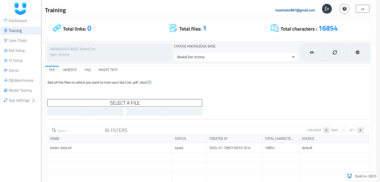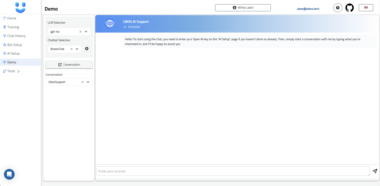Electron Terminal MCP Server: Bridging the Gap Between AI and System Terminals
In the evolving landscape of AI-driven automation, the need to seamlessly integrate Large Language Models (LLMs) with system-level operations has become increasingly critical. The Electron Terminal MCP (Model Context Protocol) Server addresses this need directly, acting as a crucial bridge between AI agents and the power of a system terminal.
This innovative server enables AI models and applications to interact with a terminal running within an Electron application. It facilitates the execution of commands, the management of terminal sessions, and the retrieval of output programmatically, opening up a wide range of possibilities for automation, remote access, and intelligent system management. The promise is that it might allow LLMs to operate the host computer through command line.
Key Features:
- Terminal Session Management: Create, execute, and terminate terminal sessions directly from AI agents or other applications. This allows for dynamic and automated control over system processes.
- Command Execution: Send commands to the terminal and receive real-time output, enabling AI agents to perform complex tasks and gather information from the system.
- Asynchronous Operations: The server operates asynchronously, ensuring that terminal operations don’t block the main application thread.
- Secure Communication: Utilizes the Model Context Protocol (MCP) to ensure secure and standardized communication between AI models and the terminal.
- Integration with Electron Applications: Seamlessly integrates with Electron applications, providing a consistent and familiar terminal environment.
- Cross-Platform Compatibility: Built on Node.js and Electron, the server is compatible with Windows, macOS, and Linux.
Use Cases:
- Automated System Administration: AI agents can use the server to automate routine system administration tasks, such as software updates, log analysis, and performance monitoring.
- Remote Access and Control: Access and control remote systems through a terminal interface, enabling remote troubleshooting, configuration, and maintenance.
- AI-Powered Development Workflows: Integrate the server into development workflows to automate build processes, run tests, and deploy applications.
- Security Auditing and Monitoring: Use AI agents to monitor system activity and detect potential security threats through terminal commands.
- Educational Applications: Provide students with a hands-on learning experience by allowing them to interact with a terminal environment through AI-powered tutors or learning platforms.
- Incident Response Automation: Use the MCP server to automatically run scripts and commands in response to security alerts, automating incident response procedures.
- Data Extraction and Transformation: Execute terminal commands to extract data from various sources and transform it into a format suitable for AI analysis.
- Custom CLI Tool Integration: Integrate existing command-line tools into AI workflows, allowing AI agents to leverage the functionality of these tools.
How it Works:
The Electron Terminal MCP Server consists of two main components:
- MCP Server (Node.js): This component listens for MCP requests via standard input/output (stdio) and acts as a bridge to the Electron backend. It utilizes the
@modelcontextprotocol/sdkto handle MCP communication. - Electron Backend: This component manages the actual terminal processes using
node-ptywithin hiddenBrowserWindowinstances. It exposes an HTTP server that the MCP server communicates with for health checks and API calls.
When an AI agent sends a command to the MCP server, the server forwards the command to the Electron backend. The backend executes the command in a terminal session and returns the output to the MCP server, which then relays the output back to the AI agent.
Installation and Usage:
- Prerequisites: Ensure you have Node.js and npm installed.
- Clone the Repository: Clone the repository from GitHub.
- Install Dependencies: Install Node modules for both the MCP server and the Electron app.
- Rebuild Native Modules: Rebuild native modules (like
node-pty) for Electron. - Start the MCP Server: Run the
index.jsscript using Node.js. - Interact via MCP: Clients connect to the
node index.jsprocess via stdio and use theuse_mcp_toolcommand.
Available Tools:
The server provides several tools for interacting with the terminal:
terminal_start: Creates a new terminal session and executes an initial command.terminal_execute: Executes a command in an existing session.terminal_get_output: Retrieves the accumulated output for a session.terminal_stop: Terminates a specific terminal session process.terminal_get_sessions: Lists all currently active sessions managed by the Electron backend.
Synergy with Filesystem MCP Server:
For a more comprehensive remote development and interaction experience, the Electron Terminal MCP server can be used in conjunction with the Filesystem MCP Server. This allows you to browse directories, read/write files, and then use the terminal server to execute commands within those directories or related to those files.
UBOS: Your Platform for AI Agent Orchestration
UBOS is a full-stack AI Agent Development Platform designed to bring the power of AI agents to every business department. By leveraging UBOS, you can seamlessly orchestrate your AI Agents, connect them to your enterprise data, build custom AI Agents using your own LLM models, and even create sophisticated Multi-Agent Systems. Imagine integrating the Electron Terminal MCP Server with UBOS. You could create an AI Agent that automatically troubleshoots server issues, deploying fixes through the terminal based on real-time monitoring data. UBOS provides the framework; the Electron Terminal MCP Server provides the low-level system access.
With UBOS, you can:
- Orchestrate AI Agents: Manage and coordinate the activities of multiple AI agents, ensuring they work together effectively to achieve your business goals.
- Connect to Enterprise Data: Integrate your AI agents with your existing data sources, allowing them to access the information they need to make informed decisions.
- Build Custom AI Agents: Develop custom AI agents tailored to your specific business needs, using your own LLM models and data.
- Create Multi-Agent Systems: Build complex multi-agent systems that can solve challenging problems and automate complex tasks.
By combining the Electron Terminal MCP Server with the UBOS platform, you can unlock the full potential of AI-driven automation and create truly intelligent systems that can adapt to changing conditions and solve complex problems. The ability to bridge the gap between AI agents and the system terminal opens up a new world of possibilities for innovation and efficiency, propelling businesses into the future of intelligent automation.
In conclusion, the Electron Terminal MCP Server is a powerful tool for anyone looking to integrate AI agents with system-level operations. Its ability to manage terminal sessions, execute commands, and retrieve output programmatically makes it an invaluable asset for automation, remote access, and intelligent system management. When coupled with a robust AI agent development platform like UBOS, the possibilities are virtually limitless, paving the way for a new era of intelligent automation and streamlined workflows.
Electron Terminal
Project Details
- nexon33/console-terminal-mcp-server
- MIT License
- Last Updated: 5/13/2025
Recomended MCP Servers
Yuque mcp server

MCP server for generating other MCP servers in Smithery

MCP server for Yahoo Finance

An MCP server that provides real-time gas price predictions across multiple blockchains.
A Model Context Protocol (MCP) server that bridges Video & Audio content with Large Language Models using yt-dlp.

To teach LLM Agents how to work with PSR.exe's hmt
Python sandboxes for llms
A MCP(Model Context Protocol) server that accesses to Lightdash
 From vibe coding to vibe deployment. UBOS MCP turns ideas into infra with one message.
From vibe coding to vibe deployment. UBOS MCP turns ideas into infra with one message.






